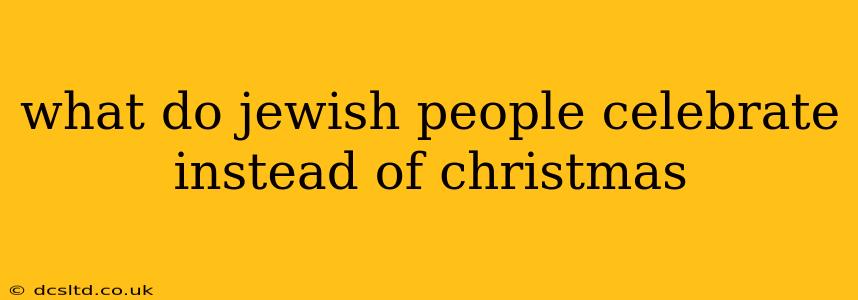What Do Jewish People Celebrate Instead of Christmas?
Christmas, a significant Christian holiday, is not celebrated by Jewish people. Instead, the Jewish faith has its own rich tapestry of holidays and festivals throughout the year, each holding deep cultural and religious significance. Understanding these celebrations provides insight into the vibrant Jewish calendar and its unique traditions.
What are the main Jewish holidays?
Jewish holidays are primarily centered around historical events, agricultural cycles, and religious observances. Some of the most prominent celebrations include:
-
Hanukkah (Festival of Lights): This eight-day festival commemorates the rededication of the Holy Temple in Jerusalem after its desecration by the Seleucid Empire. It's celebrated with the lighting of a menorah (a nine-branched candelabrum), the eating of latkes (potato pancakes), sufganiyot (jelly doughnuts), and the giving of gifts. While not directly comparable to Christmas in terms of gift-giving scale, it shares a similar festive atmosphere.
-
Passover (Pesach): This week-long festival celebrates the liberation of the Israelites from slavery in ancient Egypt. It involves a special Seder (ritual dinner) with symbolic foods like matzah (unleavened bread) and bitter herbs, telling the story of the Exodus. Passover is a time for family gatherings and reflection on freedom.
-
Shavuot (Feast of Weeks): This holiday celebrates the giving of the Torah (the first five books of the Hebrew Bible) to Moses on Mount Sinai. It's often associated with wheat harvest and is observed with readings from the Torah, dairy foods, and festive meals.
-
Rosh Hashanah (Jewish New Year): This two-day holiday marks the beginning of the Jewish new year and is a time for introspection, repentance, and prayer. Apples dipped in honey symbolize the hope for a sweet new year.
-
Yom Kippur (Day of Atonement): This holiest day in the Jewish year is a day of fasting, repentance, and seeking forgiveness for sins. It's a time for intense prayer and reflection.
Are there any other significant Jewish celebrations?
Beyond the major holidays, Jewish life is punctuated by numerous smaller festivals and observances throughout the year, often tied to the agricultural cycle or specific historical events. These celebrations often involve special meals, prayers, and community gatherings.
Why don't Jewish people celebrate Christmas?
Jewish people don't celebrate Christmas because it is a Christian holiday commemorating the birth of Jesus Christ, who is not considered a divine figure in Judaism. The focus of Jewish religious observances is on the covenants God made with Abraham and Moses, the Torah, and the history of the Jewish people.
What are the similarities and differences between Hanukkah and Christmas?
While Hanukkah and Christmas both involve gift-giving and festive meals, they have vastly different religious and historical origins. Hanukkah is a minor Jewish holiday compared to Passover or Yom Kippur, and its emphasis is on the miracle of the oil and the resilience of the Jewish people. Christmas is a major Christian holiday celebrating the birth of Jesus and the central tenets of Christianity. The similarities lie mostly in the festive atmosphere and the cultural exchange of gifts, not in their religious meaning.
In conclusion, the Jewish calendar offers a diverse array of holidays and observances that are rich in history, tradition, and spiritual meaning. While there’s no direct equivalent to Christmas, the festive atmosphere and family gatherings associated with Hanukkah share some parallels, though the underlying meanings and significance remain distinct.
